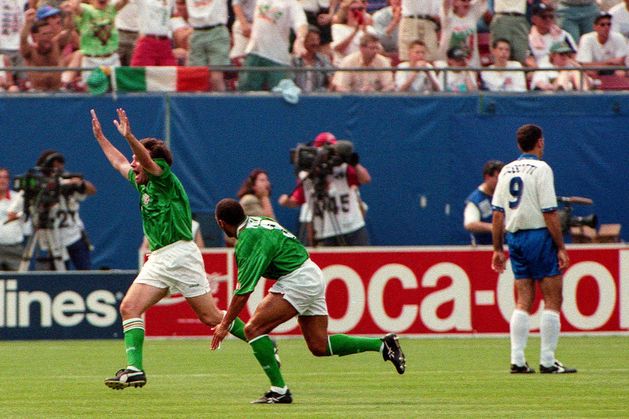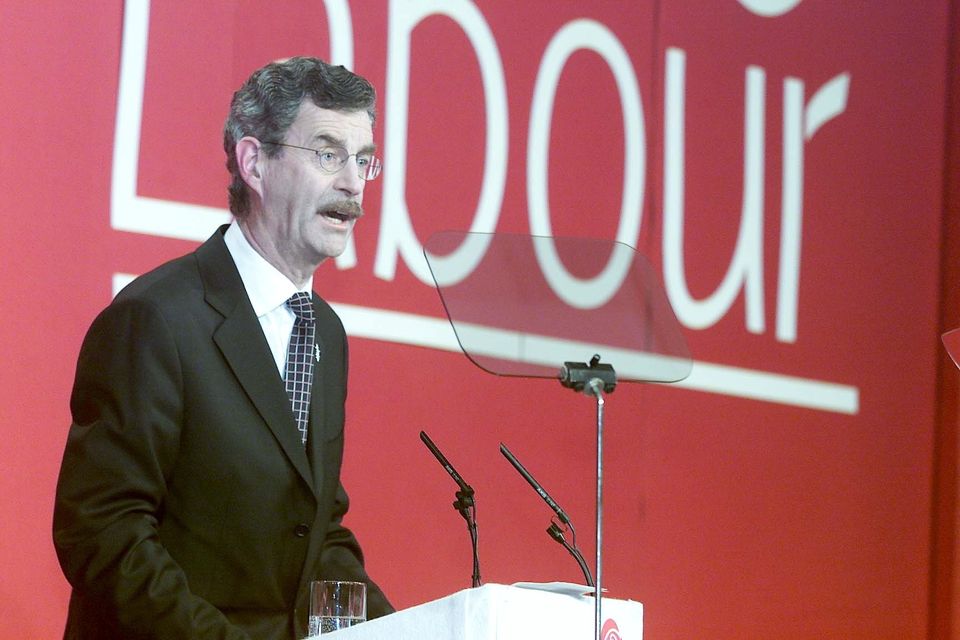Confidential files released as part of the State Papers by the National Archives revealed the government was acutely conscious of the potential fallout from large numbers of Irish soccer fans not being allowed to travel to the US for the finals.
One document indicated that tánaiste Dick Spring took the matter so seriously he had urged the US administration to be cognisant of the importance of the tournament to Irish fans.
He had urged Washington to adopt “as much flexibility and sensitivity as possible” towards Irish fans seeking visas for the USA ’94 finals.
Mr Spring met US assistant secretary of state for consular affairs Mary Ryan in Dublin in December 1993 as preparations for the finals were in hand.
He noted that the average refusal rate of holiday visas of 4pc could see around 800 Irish soccer fans having their visa applications rejected.
Ireland’s winning goalscorer Ray Houghton (centre) is congratulated by teammates Steve Staunton (left) and Terry Phelan (right) at the USA ’94 World Cup. Photo: Getty
This was based on an estimate of 20,000 supporters following the Boys in Green to the US finals.
“This might seem tiny in US terms but would have a hugely negative impact in Ireland,” Mr Spring said.
The Irish ambassador in Washington, Dermot Gallagher, had also warned US officials the previous month about the government’s concern that the 4pc of fans who might be refused visas could be “very vocal and activate public opinion in a very negative way.”
The tánaiste claimed the biggest problem was likely to be with young, single people who had not planned a trip to the World Cup in advance and would want to travel at a late stage after getting “caught up in the euphoria”.
State Papers: 1994
The Kerry TD stressed his belief that less than 1pc of Irish citizens travelling to the World Cup were likely to remain in the US.
He claimed the economic situation in the US, as well as employment assistance benefits in Ireland, meant “many would be better off in Ireland”.
However, Ms Ryan said the refusal rate on visa applications from Ireland at the time was 4.3pc.
While the US authorities wanted to be as lenient as possible, Ms Ryan said it was unlikely they would be able to do anything to reduce the rate of refusals. She also gave a lukewarm response to suggestions made by the tánaiste of having a bond system or some other form of guarantee as being “too cumbersome” and which could only be considered “in a handful of cases”.
Mr Spring replied that major publicity difficulties would be created if 400 to 500 people were refused visas to travel to the World Cup.
“If this was going to happen, the US should be prepared for the public opinion fallout,” he added.
The tánaiste also took exception to the suggestion by one US official that people in other countries such as Nigeria were similarly affected.
Mr Spring expressed hope that it might be possible for Ireland to be included in the Visa Waiver Programme in early 1994, which would allow Irish citizens to travel to the US on holiday without requiring a visa.
Dick Spring
However, officials noted that historically high visa overstay rates by Irish holidaymakers could colour the view of the US immigration authorities.
Officials at the Irish embassy in Washington had already informed the Department of Foreign Affairs that Ms Ryan was very “straight-laced” in her approach to the issuing of visas.
Mr Gallagher had asked her in November 1993 to be conscious in addressing marginal visa cases of the “massive injection of cash into the US economy” by Irish soccer supporters attending the World Cup.
The ambassador estimated that members of the Green Army would spend about $50m during their trip.
Confidential papers indicated that the government was asked to help in numerous cases where visas had been refused. Mr Spring told a TD who had contacted him about the issue in April 1994 that representations had been raised “at the highest levels of the US administration”.
He pointed out that such contacts had been made during a trip to the US by president Mary Robinson in May 1993, even before Ireland’s qualification for the World Cup finals.
Files also reveal that a number of TDs, including Bobby Molloy, Pat Rabbitte and Enda Kenny, complained about the US embassy’s policy on issuing visas at a dinner hosted in Dublin in December 1993 for Ms Ryan.
The files showed that the US ambassador, Jean Kennedy Smith, suggested at the end of the meal that a group of TDs could form a small committee that could liaise with the US embassy in Dublin on the issue.
However, other consular staff were “somewhat taken aback” by the ambassador’s suggestion.
One US diplomat told Irish officials that “there can be no question of ceding to TDs the decision-making rights of US consular officers”.



